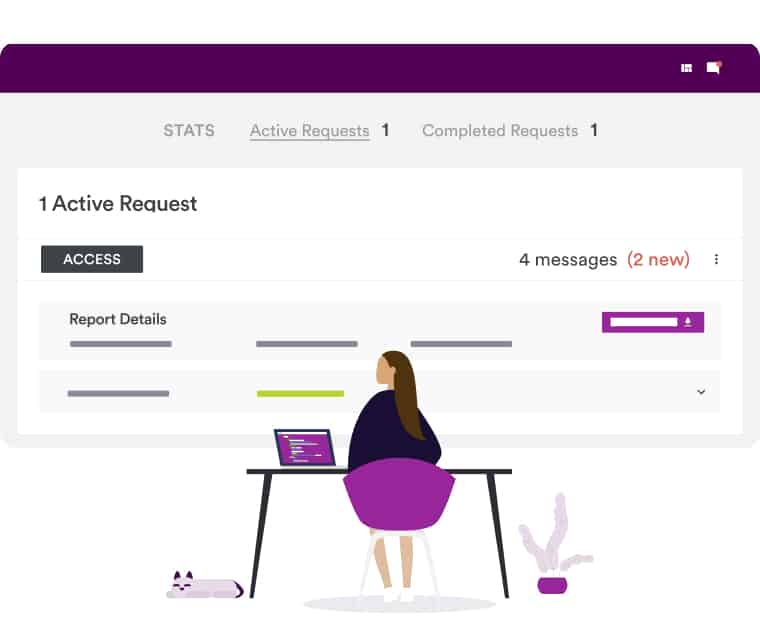What is a Data Subject Access Request (DSAR)?
Laws in the EU, UK, and several U.S. states provide a data subject (a person) with the right to see the personal data a business has on them, in addition to knowing how that business is using the data. A person can exercise these rights by making a Data Subject Access Request (DSAR) to a business holding their data. Is your organization able to comply?


Data Subject Access Request Fulfillment
Using our PII discovery technology and DSAR Robotic Automation, we provide end-to-end data subject access request fulfillment services, no matter the volume. We also provide on-demand reports including DSAR types; locations of origin; fulfillment response rates; and related DSAR trends and forecasting. By outsourcing the cumbersome data subject access request fulfillment obligation to us, our clients reduce the risk of untimely responses, data subject complaints, and data protection authority inquiries.
Virtual DSAR Center
Steer clear of privacy law violations and the resulting regulatory fines. Let our virtual DSAR Fulfillment Center do the work for you.
- A data subject submits a DSAR directly to our Fulfillment Center via our secure DSAR portal.
- We verify the data subject using multiple means and sources.
- You can either provide us with the Data Subject's personal data or we can plug into and search your data stores for all related personal information.
- We package all related personal data for dissemination to the data subject through our secure electronic portal.
- The data subject can review their data via our portal or even download it.
- When a data deletion request is filed, we find and delete or anonymize data as directed.

It’s that easy with Advisori. Avoid time-consuming and costly manual DSAR fulfillment with our platform’s automated efficiency.

What rights does an individual have?
Depending on the law (be it GDPR, CCPA, or others), data subjects may have some or all of these rights:
- Access to the data the business holds on the person.
- Deletion of their data.
- Correction of their data.
- Ability to opt-out of the sale of their personal data to a third party.
- Ability to opt-out of the processing of their personal data.
- Data portability (the right to receive an electronic copy of their data).
Failure to comply with any of these requirements could leave a business at risk of legal action, reputational loss, and financial penalty.
Data rights are good for consumers, but DSARs can be a burden on businesses.
Many businesses struggle with fulfilling even routine DSARs. For instance, a business must first properly verify that the data subject making the request is who they claim to be. This necessity is becoming increasingly critical as more and more nefarious actors seek to steal personal data. Businesses must meticulously vet and verify persons requesting to exercise their data rights.
Once a data subject is fully verified, the data discovery process itself can be cumbersome. Businesses often collect and store customer data via numerous systems used to accomplish specific customer and business needs, like customer bookings and marketing. The mere task of finding a certain person’s data across multiple data stores can be like trying to find a needle in a haystack.
Hundreds or even thousands of copies of the same data can be in numerous databases (what we call data sprawl), making data deletion requests a nightmare to fulfill. In the data deletion/anonymization context, a multiplicity of systems means the efforts to find, erase, or anonymize data upon request can be that much more time consuming – made even more complicated by businesses still using manual data subject verification and fulfillment methods. Manual methods are slower, costlier, more labor intensive, and subject to human error.

DSAR laws are changing.
Increased attention on privacy rights and ongoing developments in consumer privacy laws are putting DSAR compliance at the forefront of global conversations. Businesses must contend with emerging regulations in individual U.S. states, the potential for Federal legislation in the near future, and new laws in jurisdictions as wide ranging as Brazil and China. Take command of your responsibilities. Get answers to your DSAR questions.
Did you know?
According to a recent survey by Gartner, the average data subject rights request can cost a business over $1,400 per request – and these costs can grow even higher.
Businesses rely on our full-service DSAR Fulfillment Center.
If you’re looking to outsource your DSAR fulfillment processes while meeting all regulatory requirements and deadlines, turn to Advisori. Bottom line: we help our clients fulfill DSARs cheaper, faster, and better than anyone else.
Don’t wait to get started.
Reach out to our team to learn more.